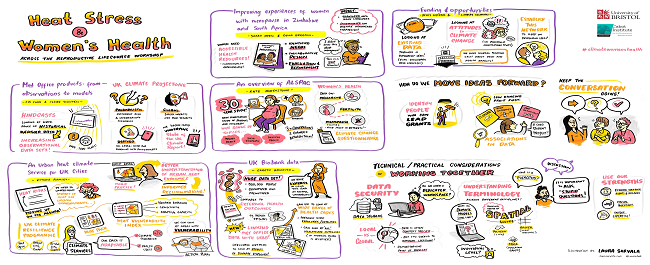Heat stress and women’s health over the reproductive life course

Bringing together researchers from multiple disciplines to find out the effects of rising heat stress on women’s health.
The challenge
Mean temperatures are projected to increase and heat waves are expected to become more frequent and severe. Climate change is expected to affect men and women differently due to biological, socioeconomic and cultural factors. In particular, heat stress uniquely affects women because they have a compromised ability to thermoregulate during pregnancy and around menopause. This could reduce their ability to respond or adapt physiologically to a warming climate.
Little research has been done to look at heat stress and women’s reproductive health and none has focused on menopausal health. Given that about half of the population go through at least one of these life stages, more research is needed to inform the response of UK and global health systems to take into account gendered issues like pregnancy and menopause when preparing for climate change.
What we've been doing
We brought together 25 researchers from multiple disciplines to discuss how we can study the effects of rising heat stress on women’s health. We held a two-day workshop in Bristol.
The aims were to:
- Introduce and discuss the challenge;
- Generate a list of research questions and themes;
- Identify and discuss potential sources of data and methods to address these questions;
- Identify project(s) to take forward for major grant submissions, and who will lead on each.
Following the workshops, we have been working with attendees to ensure progress on grant applications is made.
How it helps
By building capacity to conduct interdisciplinary research around the effects of heat stress on women’s health, our project will help identify ways of mitigating and managing health risks, thereby helping to achieve better health and quality of life on our warming planet.
We focus on effects of heat stress on pregnancy complications and menopausal health, so our project is relevant to a large proportion of the global population, with potentially far-reaching consequences. At both of these life stages, women can experience symptoms like hot flashes and night sweats, which can cause sleep disturbances, fatigue, cardiovascular events, reduced quality of life and mood disorders. In addition, during pregnancy, heat can exert further physiological strain and alter blood flow to the placenta, and high ambient temperatures have been associated with risk of hypertensive disorders of pregnancy and placental abruption, as well as preterm births, stillbirths, and fetal health outcomes.
The impact of the research
A particularly exciting and fruitful impact of this work is the identification of a cross-disciplinary, funded PhD project, for which we have recently been recruiting (spring 2023). This PhD project will take the the initial project and ideas from the workshops forward through further research, and is funded through a new Climate Change and Health research partnership.
Elizabeth Blackwell Institute for health research and the Cabot Institute for the Environment, at the University of Bristol, are working together to improve our knowledge of the impacts of climate change on our human and planetary health. The Climate Change and Health research programme brings together experts from different disciplines to understand and address the complex and interwoven areas of climate and health. Together we can find solutions for a healthier future… for us and for the planet.
Investigators
- Eunice Lo, School of Geographical Sciences
- Gemma Sharp, MRC Integrative Epidemiology Unit, Bristol Medical School Population Health Sciences (no longer at University of Bristol)
 Lead researcher profile
Lead researcher profile
Dr Eunice Lo, School of Geographical Sciences